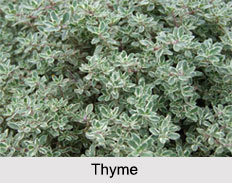 Indian herbs are considered to be helpful for achieving good health with the help of natural sources. The age old traditions associated with herbs are kept alive by the people of medicinal milieu, considering their effects on many diseases and the belief in herbal therapy has been creating in millions of people, since ancient times. Though the Indian herbs are used extensively in herbal therapy and other alternative treatments, they should be consumed in proper amount because over consumption of some herbs may lead to bad health or may have some kind of side effects. There are some agricultural institutes, which take initiatives to cultivate Indian herbs that can be the source of life giving medicines. Apart from this, there are yoga centers, where medicines are prepared like the Patanjali Yogpith of Haridwar.
Indian herbs are considered to be helpful for achieving good health with the help of natural sources. The age old traditions associated with herbs are kept alive by the people of medicinal milieu, considering their effects on many diseases and the belief in herbal therapy has been creating in millions of people, since ancient times. Though the Indian herbs are used extensively in herbal therapy and other alternative treatments, they should be consumed in proper amount because over consumption of some herbs may lead to bad health or may have some kind of side effects. There are some agricultural institutes, which take initiatives to cultivate Indian herbs that can be the source of life giving medicines. Apart from this, there are yoga centers, where medicines are prepared like the Patanjali Yogpith of Haridwar.History of Indian Herbs
Ancient history of Indian herbs depicts that the Rig Veda, the oldest document of human knowledge, carries evidence regarding the use of medicinal plants in the treatment of various diseases. The tradition of Ayurveda originated around 5000 years ago. Ayurveda, "the science of life", offers rich and comprehensive outlook to a healthy life. The basic concept of Ayurveda is to maintain a balance of body, mind and spirit, along with the usage of some herbs that are widely cultivated in India for medicinal usage. The ancient book of Charaka, which was written around 1000 BC, concentrates on medicine and depicts that in ancient times the practitioners used to treat diseases with the help of decoctions from different herbs.
Types of Indian Herbs
 Indian herbs are used as medicinal herbs, culinary herbs, aromatic herbs and ornamental herbs. They even have spiritual usage in some cases. These herbs and their uses are given below.
Indian herbs are used as medicinal herbs, culinary herbs, aromatic herbs and ornamental herbs. They even have spiritual usage in some cases. These herbs and their uses are given below.Indian Medicinal Herbs
Most of the Indian herbs are used widely used due to their medicinal values. For medicinal or spiritual use, any part of a plant might be considered to be herb. These parts are leaves, roots, flowers, seeds, resin, root bark, inner bark (cambium), berries and sometimes the pericarp or other portions of the plant. Plants contain phytochemicals that affect body. Medicinal herbs have curative effects and are used to prepare herbal medicines. They are considered as having powerful effects on curing certain diseases. Some types of herbal extract, such as the extract of St. John's wort (Hypericum Perforatum) or of kava (Piper Methysticum) can be used to relieve depression and stress. However, large amounts of these herbs may lead to poisoning. Therefore, they should be used with caution. One herb-like substance called 'Shilajit' is used to lower blood glucose levels. Thus, the herb is especially important for those suffering from diabetes. Some Indian herbs that are famous for their curative effects are abrus precatorius, adhatoda vasica, aloe vera, ashwagandha, asparagus racemosus, basil, bhringaraj, cardamom, castor, ginger, guggul, lemongrass, safed musli, sandalwood, sarsaparilla, shankapushpi, solanum nigrum, tinospora cordifolia and vinca rosea.
For more, visit the link below: